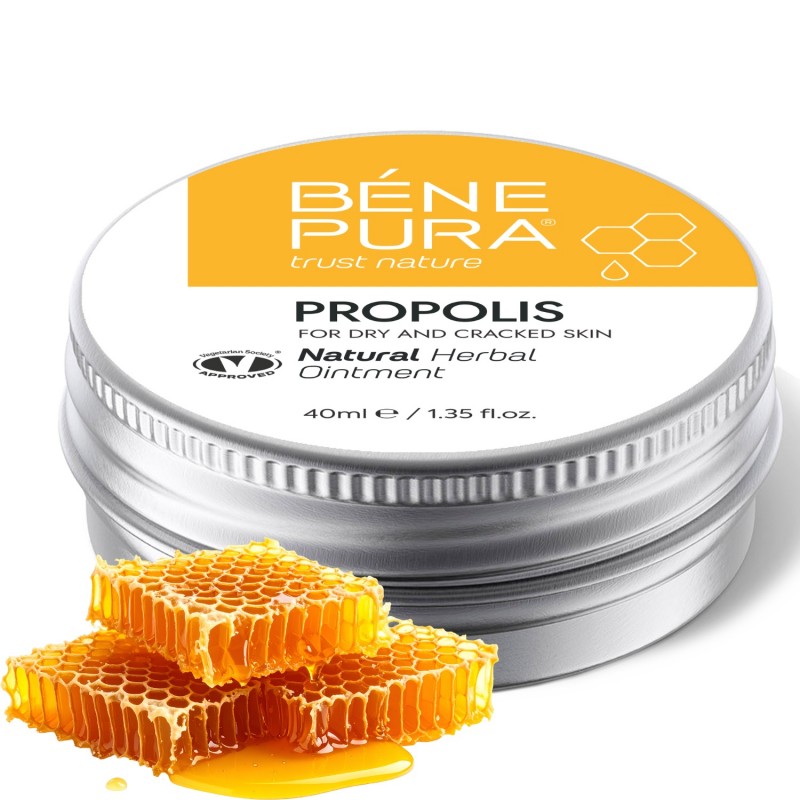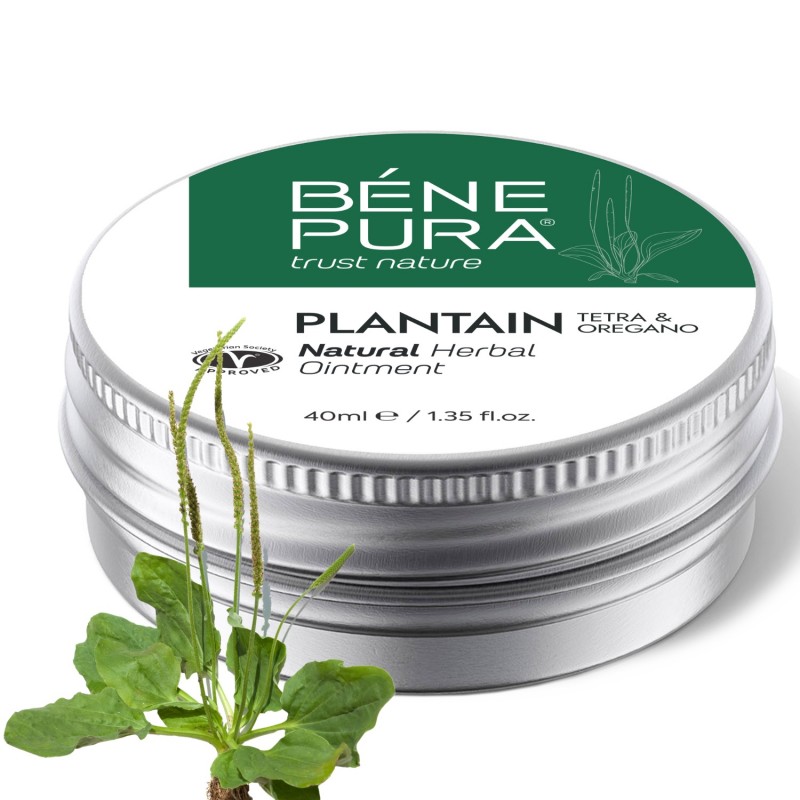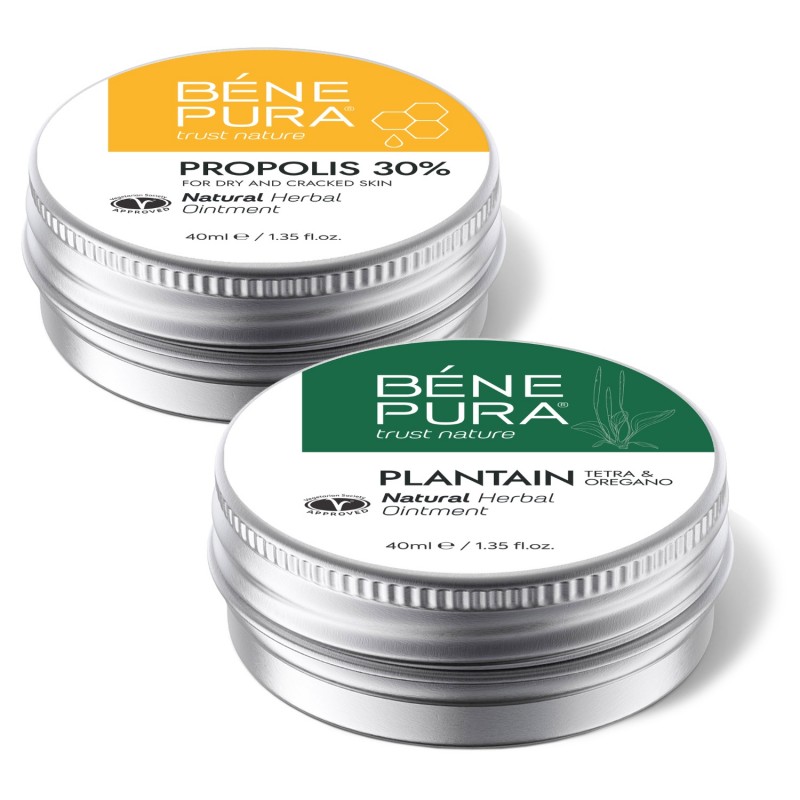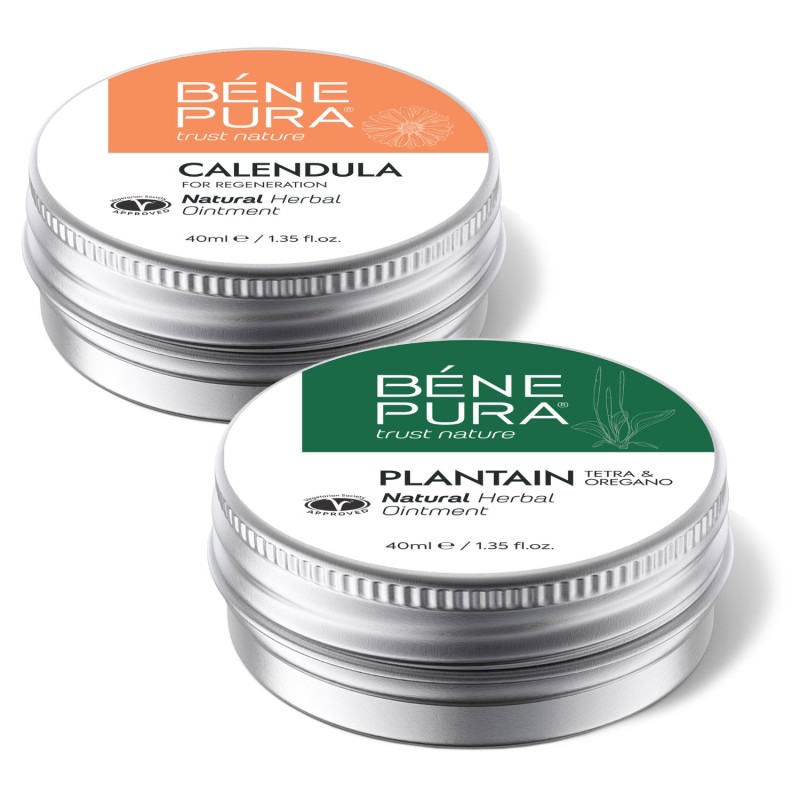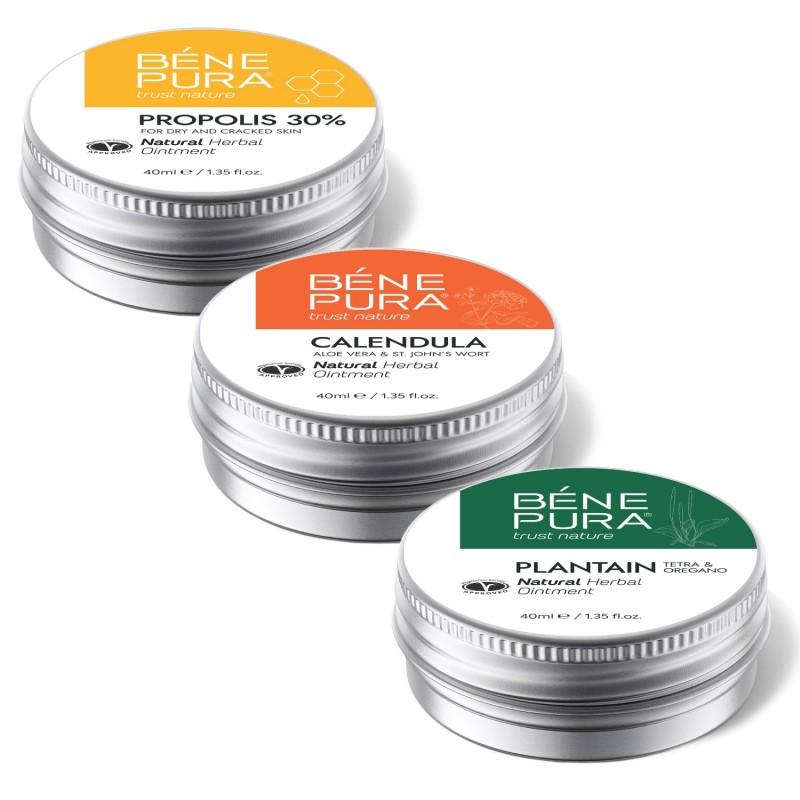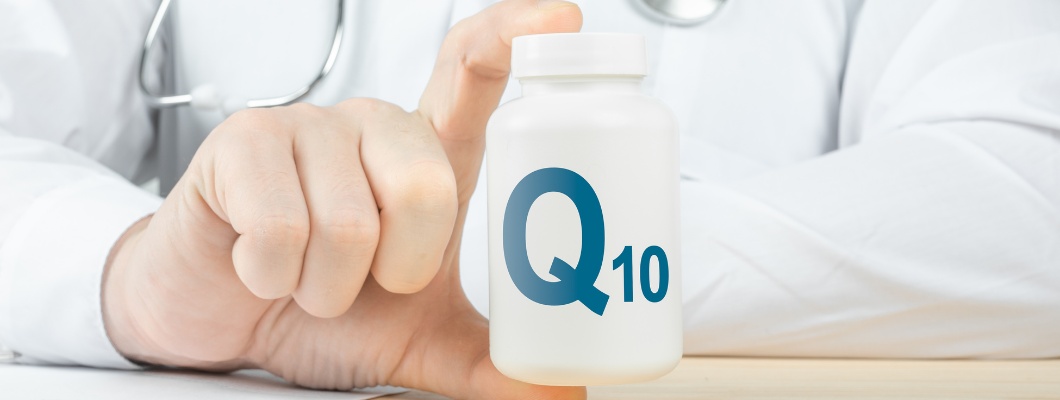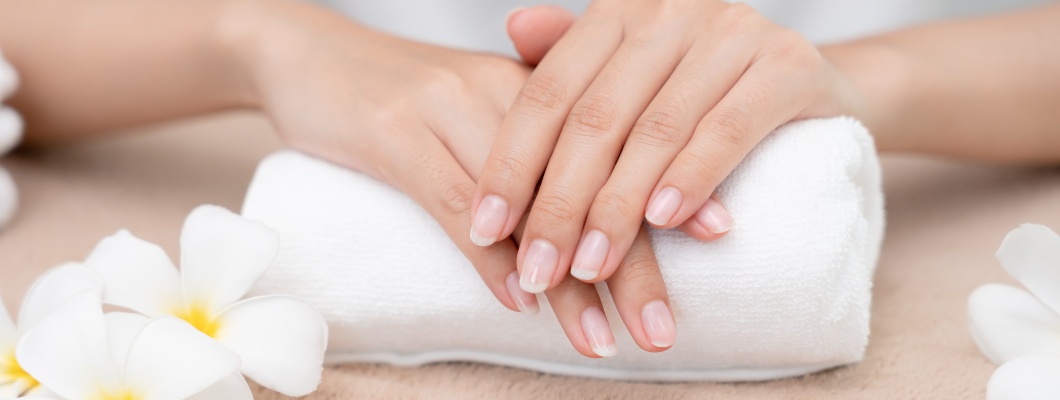Eczema: How to Recognize and Treat It Effectively
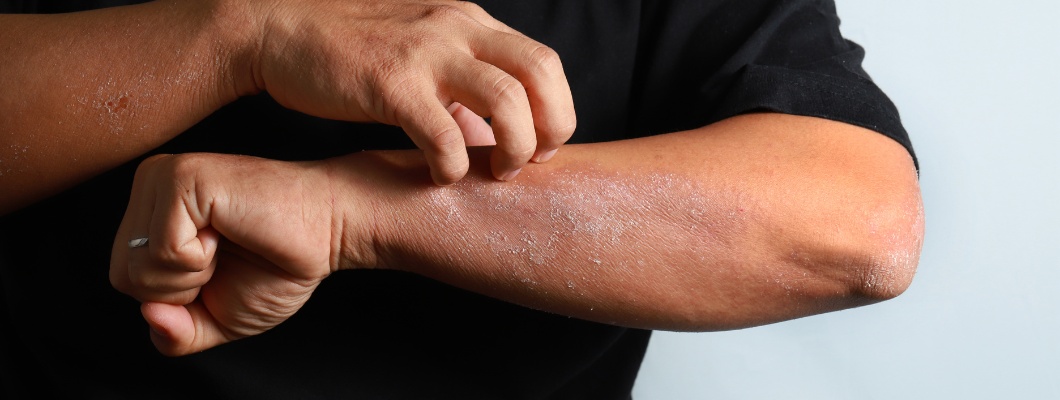
Eczema is one of the most common chronic skin conditions, affecting millions of people worldwide. Although not contagious, Eczema often requires ongoing care and attention to manage symptoms and avoid flare-ups.
In this article, we will look at everything you need to know about Eczema - from causes and symptoms to useful tips, treatment and prevention options.
Table of Contents
1. What is Eczema?
Eczema is a chronic inflammatory skin condition that causes itching, redness, dryness and scaling. It can affect any age group and can appear on different parts of the body such as the face, hands, feet and skin folds.
Although not life-threatening, Eczema can significantly impair quality of life. People suffering from this condition often experience not only physical discomfort but also emotional distress.
Eczema affects the skin barrier - an important protective layer that protects the body from external aggressors such as bacteria, viruses and pollutants. In people with Eczema this protective layer is weaker, making the skin more vulnerable to irritants and infections.
- Eczema is characterized by its stages. An exacerbation, or so-called "flare-up", is a period when symptoms become more severe;
- Between exacerbations the skin may appear calmer, but often remains dry and sensitive;
- Prolonged rubbing or scratching of the affected areas can lead to thickening of the skin called lichenification.
Eczema can affect people of all ages and skin types with symptoms ranging from mild to severe. Eczema is not contagious but it can be triggered or worsened by a variety of factors including allergies, stress, weather conditions and even certain foods.
2. Types of Eczema
Eczema can manifest in many different forms. The most common type of Eczema is atopic dermatitis but there are other varieties such as contact Eczema, seborrheic dermatitis and dyshidrotic Eczema.
Each of these forms has its own characteristics and develops as a result of different reasons:
Atopic dermatitis
This is the most common type of Eczema which usually begins in childhood. Atopic dermatitis is often associated with other allergic conditions such as asthma and hay fever. Symptoms include severe itching, redness and dry skin on the face, neck, hands or knees.
Contact Eczema
This type of Eczema is caused by contact with an irritant or allergen. Contact Eczema can be divided into two types:
- Irritant Contact Eczema: Occurs when the skin comes into contact with chemicals, soaps or other substances that damage the skin barrier;
- Allergic Contact Eczema: Occurs as a skin reaction to allergens such as metals, latex or plants.
Seborrheic dermatitis
Seborrheic dermatitis affects areas of the body with a high concentration of oil glands such as the scalp, face and upper chest. It causes flaking, redness and oily patches on the skin. In infants this condition is known as "cradle cap".
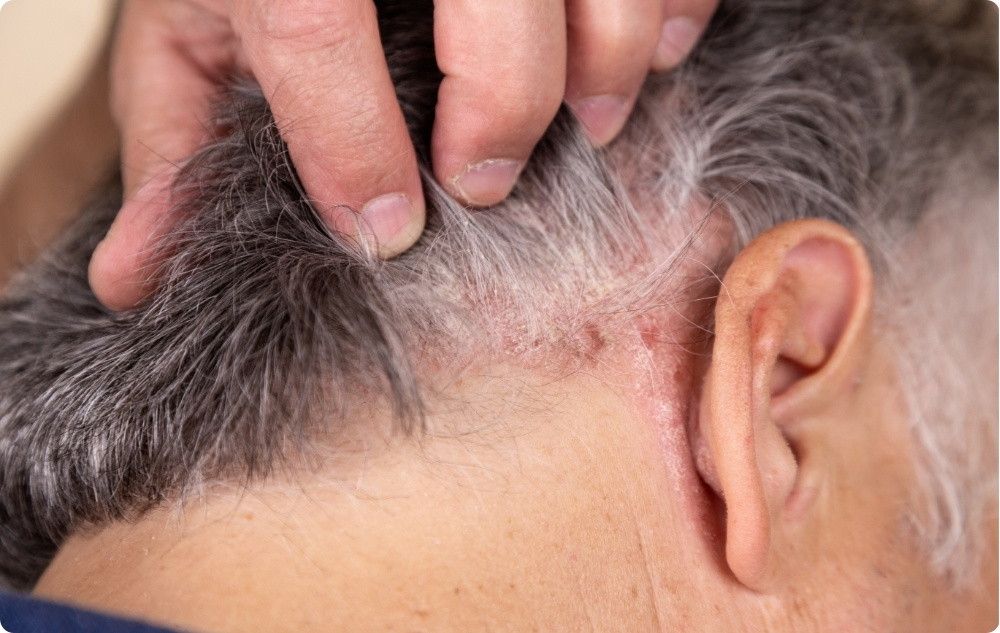
Dyshidrotic Eczema
This type of Eczema is characterized by small, itchy blisters on the hands and feet. It usually occurs in people who are stressed or have come into contact with allergens. The blisters can be painful and can lead to cracking of the skin.
Nummular Eczema
Nummular Eczema is characterized by round, itchy patches on the skin. This type is often associated with dry skin and can be triggered by insect bites or injuries.
Stasis Eczema
Stasis Eczema usually affects people with poor circulation, most often in the lower extremities. Symptoms include redness, swelling, and peeling of the skin, and it often develops over varicose veins.
Microbial Eczema
This Eczema is caused by bacterial, viral or fungal infections. It usually manifests itself with inflammation, itching and discharge from the affected areas.
Each of these types of Eczema requires an individual approach when it comes to diagnosis and treatment which emphasizes the importance of consulting a dermatologist.
3. Causes of Eczema
The causes of Eczema are complex and often linked to multiple interacting factors. Genetic predisposition is one of the main causes - if there is a family history of Eczema, asthma or allergies the likelihood of developing Eczema is significantly higher.
Genetic factors
- People with a family history of Eczema, asthma or hay fever;
- Genetic mutations related to the skin's protective function such as mutations in the gene responsible for the production of filaggrin.
Impaired skin barrier function
- Reduced ability of the skin to retain moisture;
- Increased vulnerability to irritants, bacteria and allergens.
External factors
- Changes in climate with the change of seasons;
- Air pollution and dust;
- Contact with chemicals, perfumes or metals.
Overactivity of the immune system
- An excessive reaction of the immune system to common substances;
- Chronic inflammation resulting from an overactive immune system.
Hormonal changes
- Reduced estrogen levels during menopause;
- Increased sebum production during puberty;
- Increased hormone levels during pregnancy;
- High cortisol levels in the body.
Lifestyle and diet
- Consumption of foods that cause allergic reactions such as dairy products, eggs and nuts;
- High levels of stress and insufficient sleep.
4. Symptoms of Eczema
Eczema symptoms can manifest in different forms, depending on the severity and type of the condition. Recognizing these symptoms is key to a timely diagnosis and appropriate treatment.
1. Physical manifestations
- Itching: One of the most common and often most bothersome symptoms. Itching can be intense and disrupt sleep;
- Redness: Affected areas are often visibly inflamed and red;
- Dry skin: The skin may appear tight and cracked even outside of flare-ups;
- Blisters: In some cases small fluid-filled blisters may appear that burst easily.
2. Chronic changes
- Lichenification: With prolonged scratching or rubbing the skin becomes thickened and more pronounced;
- Hyperpigmentation: The pigmentation of the skin may change with the affected areas becoming darker or lighter.
3. Where on the body do the symptoms occur?
- Face and neck: Often in children, Eczema affects the cheeks, and in adults - the area around the eyes and lips;
- Hands and feet: One of the most commonly affected areas especially in contact Eczema;
- Body folds: Areas such as elbow and knee folds are prone to developing symptoms.
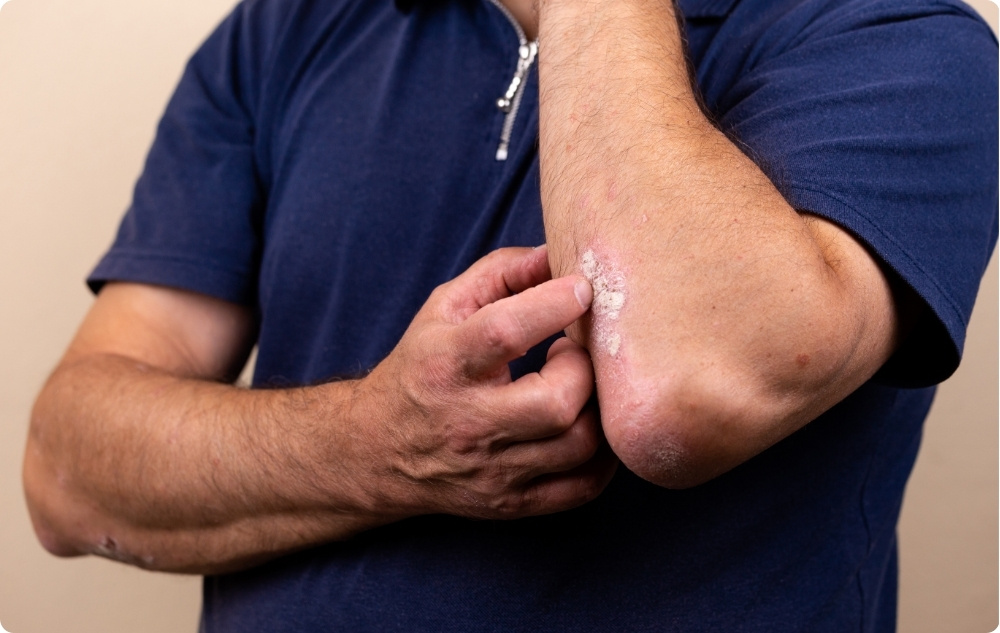
4. Impact on quality of life
- Disturbed sleep: Intense itching at night can lead to chronic fatigue;
- Social discomfort: Visible skin changes can cause embarrassment and low self-esteem;
- Emotional distress: Prolonged symptoms often lead to anxiety and depression.
Spotting the symptoms on time allows for earlier initiation of treatment and reduces the risk of complications.
Eczema in different age groups
Eczema can affect people of all ages but the way it manifests and is treated often depends on the age group.
1. Eczema in babies
In babies, Eczema often appears on the cheeks, scalp and limbs. It is best to use mild hypoallergenic creams and avoid soaps and synthetic fabrics.
2. Eczema in children
In children, Eczema often affects the elbow and knee creases as well as the hands and feet. Children may experience embarrassment from the visible symptoms which can lead to social isolation.
3. Eczema in adults
Eczema in adults can manifest in more severe forms with thickened skin and persistent itching. Stress, hormonal changes and certain occupational hazards, such as working with chemicals, are often the main triggers.
5. Eczema Treatment
Eczema treatment aims not only to relieve symptoms but also to prevent future flare-ups.
Topical therapies
- Moisturizing products: Regular use of emollients helps restore the skin barrier and reduce dryness;
- Corticosteroid creams: Used to reduce inflammation and itching in acute phases;
- Immunosuppressive creams: Recommended for long-term use in moderate to severe cases.
Medicines
- Antihistamines: Used to relieve itching, especially at night;
- Oral corticosteroids: Prescribed for severe flare-ups but only used for short-term treatment;
- Immunomodulators: Drugs such as cyclosporine may be effective in chronic Eczema when other methods are not sufficient.
Alternative therapies
- Phototherapy: Exposure to UV rays under medical supervision to reduce inflammation;
- Acupuncture and acupressure: Traditional Chinese techniques that stimulate specific points on the body using needles ( acupuncture ) or pressure ( acupressure ).
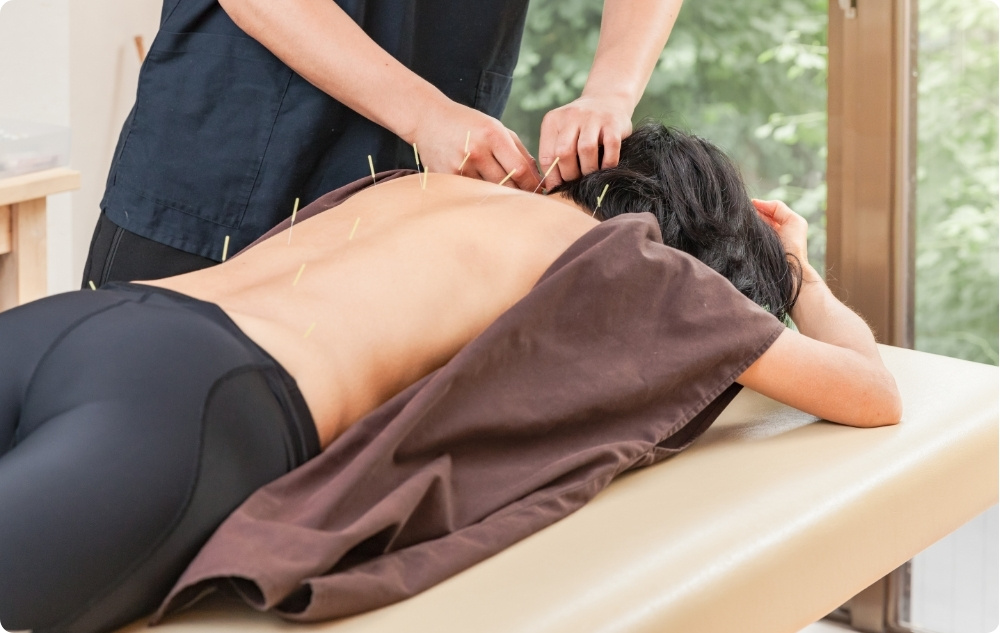
6. How to Deal with Eczema at Home?
1. Keep your skin hydrated
- Use unscented moisturizing creams or lotions immediately after bathing to lock in moisture;
- Apply moisturizers several times a day especially on dry and sensitive areas.
2. Avoid contact with irritants
- Avoid products with harsh chemicals, perfumes and alcohol;
- Wear clothes made of soft and breathable fabrics such as cotton and avoid synthetic fabrics.
3. Control the temperature and humidity in your home
- Maintain moderate humidity in your home, especially in winter when the air is drier;
- Avoid sudden temperature changes that can irritate the skin.
4. Maintain a proper diet
- Include foods rich in omega-3 fatty acids ( such as fish, flaxseed, and walnuts ) in your diet to reduce inflammation;
- Avoid foods that can trigger flare-ups ( dairy products, eggs, soy products ).
5. Use appropriate cleaning agents
- Choose hypoallergenic and fragrance-free soaps and detergents;
- Wash your clothes with neutral detergents and avoid fabric softeners.
6. Use herbal ointments or creams for Eczema
- Apply ointments that hydrate the skin, retain moisture and create a protective barrier;
- Natural ointments with Propolis, Plantain, Aloe Vera or Calendula relieve irritation and help the skin heal.
For high-quality, 99% natural herbal ointments containing some of the best herbs for Eczema, you can check out our Herbal Ointments for Skin Rashes and Inflammation.
7. Conclusion
Eczema is a condition that requires constant care and attention. It is important to recognize the symptoms early and avoid irritants that aggravate the condition.
Regular skin hydration and following medical recommendations can significantly reduce flare-ups and improve quality of life.
SOURCES:
1. WebMD: Eczema: What’s the Best Treatment for You? (31.01.2025)
2. National Eczema Association: Eczema Treatments (31.01.2025)

